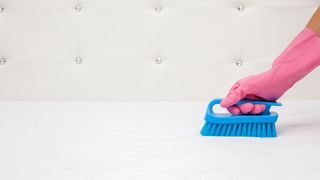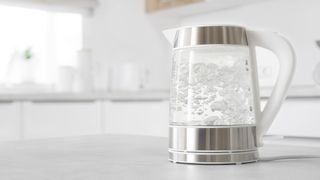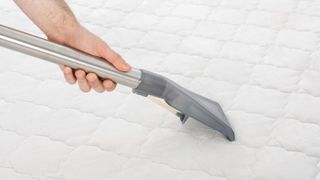You've been cleaning your mattress wrong — 3 household items you should never use
Cleaning your mattress this weekend? Then step away from the bleach

Cleaning your mattress on a regular basis is essential for a good night’s sleep and overall hygiene. But you may be surprised to know that your cleaning methods could be doing more harm than good.
You don’t have to rush out and spend a fortune on fancy cleaning solutions as it’s likely you have the items to clean your mattress already in your home. But there are some household items that you should never use when cleaning a mattress and we're covering them here to help you avoid a mattress cleaning disaster.
If your mattress is over eight years old or you suspect it is the reason why you’re not sleeping very well then it could be time to invest in a new one. Our guide to this year's best mattresses for all sleepers and budgets contains our top recommendations.
3 household items you should never use when cleaning your mattress
If you don’t keep on top of cleaning your mattress then it can become a breeding ground for bacteria, stains, odors and even dust mites or even worse bed bugs. Cleaning your mattress can be done with some regular household items but there are a couple of items you should avoid.
1. Bleach
It goes without saying that harsh chemicals of any sort are bad news for your mattress. But bleach in particular can cause damage to the fibers of your mattress causing it to break down over time. When your mattress weakens it will lose its shape and become uneven which means you’ll be uncomfortable and at risk of waking up with aches and pains.
Using bleach on your mattress can also cause discoloration and ruin the fabric by leading to unsightly stains and faded spots. Plus, bleach stinks, it’s strong pungent odor will linger and can be harmful to your health when inhaled.
2. Boiling water

Using boiling water on your mattress is a bad idea for several reasons. But it is an especially bad idea if your mattress is made using memory foam, latex or natural fibres like wool. This is because boiling water can warp, shrink and melt those materials which then leads to them losing their shape and breaking down the structure making them lose all their supportive qualities.
Sign up to get the BEST of Tom's Guide direct to your inbox.
Get instant access to breaking news, the hottest reviews, great deals and helpful tips.
If you have a memory foam mattress then you should avoid using boiling water as the foam is extremely heat sensitive, but also you avoid using an excess of water completely as this material is porous and will be difficult to dry out leading to mold and mildew growth.
Although, mold and mildew is also another reason to avoid using boiling water on your mattress, because introducing hot liquid to your bed creates a warm, moist environment that is perfect for mold growth. Mold can cause bad odors, trigger allergies and pose other health risks.
You should also think about your own personal safety, handle boiling hot water is dangerous and could increase the likelihood of burns and scolds on your skin.
3. Neat essential oils
We love essential oils and they’re a great way of making your home smell lovely but you should avoid using them directly on the surface of your mattress. Essential oils are highly concentrated so if you use them on the mattress surface then they’re going to stain.
Essential oils can also cause skin irritation, especially if you use citrus oils like lemon or orange which are often used for cleaning because of their fresh scent. The scent is another issue when using undiluted essential oils as it can irritate the respiratory system and lead to coughing, sneezing and heightened symptoms of asthma.
Essential oils should also be avoided if you have pets as certain oils such as tea tree, peppermint and ylang-ylang are toxic to animals. So if you share your sleep space with a furry friend, don’t use essential oils at all.
5 household items you can use to clean a mattress
1. Baking soda
Baking soda is a staple for any cleaning task. This powder absorbs excess liquid and can also help to neutralize odors. To use it just sprinkle a generous amount over the surface of your mattress, leave to sit for a couple of hours and then vacuum it up. Baking soda is also a great way of removing stubborn stains from your mattress.

2. Vacuum cleaner
Your household vacuum can tackle more than just your floors. Vacuum your mattress regularly to remove any dirt, debris and dander which can build up and lead to stains, funky odors and eventually dust mites or even bed bugs. Vacuum your mattress at least once a month, or more if your home gets dusty quickly. It’s also a good idea to invest in one of the best mattress protectors to add an extra layer of protection in between you and the surface of your bed.
3. Mild detergent
When it comes to cleaning your mattress you don’t need any fancy cleaners as mild laundry detergent or regular old dish soap will do a great job. Dilute it with water and use it to spot treat any spills, accidents or stains on your mattress. Don’t forget to always blot the stain and avoid soaking the mattress fabric.
4. White vinegar
Diluted white vinegar is a natural and effective way to disinfect and deodorize your mattress. We recommend that you mix one part vinegar to one part water in a clean spray bottle and spritz the entire mattress and leave it to completely air if you want to get rid of bad smells.
If you want to spot clean stains just spray the area in question and then blot the mattress with a dry cloth or paper towel. Repeat until the stain is gone and don't feel disheartened if it doesn't lift after the first attempt, it can sometimes take multiple attempts to get rid.
5. Cornstarch or baby powder
We all sweat and secrete body oils when we sleep so if you need to remove body oil or any other grease stain from your mattress, cornstarch or talcum powder will do the job. Cornstarch and baby powder are a fine, powdery substances with a large surface area, this allows them to easily absorb liquids including grease and oil.
As the oils are absorbed the powder will clump together and dry which can then easily be removed from the fabric. To do this just shake a generous helping onto the area you want to clean and leave to rest for a couple of hours. Once you’ve left it sit just vacuum the area and you’ll find the oil stain gone.

Rachael is a freelance journalist based in South Wales who writes about lifestyle, travel, home and technology. She also reviews a variety of products for various publications including Tom’s Guide, CreativeBloq, IdealHome and Woman&Home. When she’s not writing and reviewing products she can be found walking her Sealyham and West Highland terrier dogs or catching up on some cringe-worthy reality tv.
Most Popular

